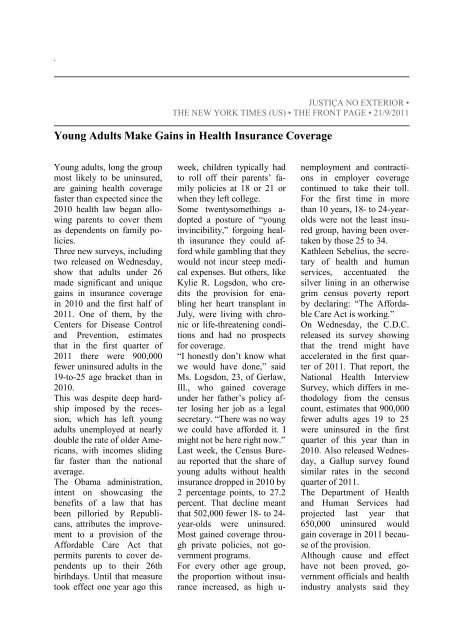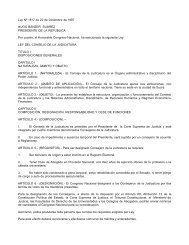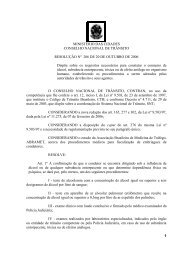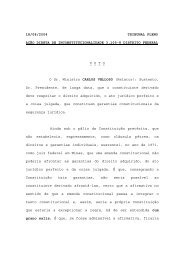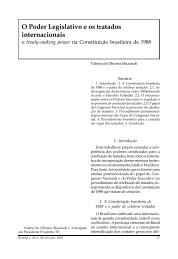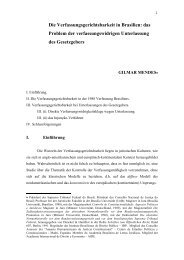STF NA MÍDIA
STF NA MÍDIA
STF NA MÍDIA
Create successful ePaper yourself
Turn your PDF publications into a flip-book with our unique Google optimized e-Paper software.
.<br />
JUSTIÇA NO EXTERIOR •<br />
THE NEW YORK TIMES (US) • THE FRONT PAGE • 21/9/2011<br />
Young Adults Make Gains in Health Insurance Coverage<br />
Young adults, long the group<br />
most likely to be uninsured,<br />
are gaining health coverage<br />
faster than expected since the<br />
2010 health law began allowing<br />
parents to cover them<br />
as dependents on family policies.<br />
Three new surveys, including<br />
two released on Wednesday,<br />
show that adults under 26<br />
made significant and unique<br />
gains in insurance coverage<br />
in 2010 and the first half of<br />
2011. One of them, by the<br />
Centers for Disease Control<br />
and Prevention, estimates<br />
that in the first quarter of<br />
2011 there were 900,000<br />
fewer uninsured adults in the<br />
19-to-25 age bracket than in<br />
2010.<br />
This was despite deep hardship<br />
imposed by the recession,<br />
which has left young<br />
adults unemployed at nearly<br />
double the rate of older Americans,<br />
with incomes sliding<br />
far faster than the national<br />
average.<br />
The Obama administration,<br />
intent on showcasing the<br />
benefits of a law that has<br />
been pilloried by Republicans,<br />
attributes the improvement<br />
to a provision of the<br />
Affordable Care Act that<br />
permits parents to cover dependents<br />
up to their 26th<br />
birthdays. Until that measure<br />
took effect one year ago this<br />
week, children typically had<br />
to roll off their parents’ family<br />
policies at 18 or 21 or<br />
when they left college.<br />
Some twentysomethings a-<br />
dopted a posture of “young<br />
invincibility,” forgoing health<br />
insurance they could afford<br />
while gambling that they<br />
would not incur steep medical<br />
expenses. But others, like<br />
Kylie R. Logsdon, who credits<br />
the provision for enabling<br />
her heart transplant in<br />
July, were living with chronic<br />
or life-threatening conditions<br />
and had no prospects<br />
for coverage.<br />
“I honestly don’t know what<br />
we would have done,” said<br />
Ms. Logsdon, 23, of Gerlaw,<br />
Ill., who gained coverage<br />
under her father’s policy after<br />
losing her job as a legal<br />
secretary. “There was no way<br />
we could have afforded it. I<br />
might not be here right now.”<br />
Last week, the Census Bureau<br />
reported that the share of<br />
young adults without health<br />
insurance dropped in 2010 by<br />
2 percentage points, to 27.2<br />
percent. That decline meant<br />
that 502,000 fewer 18- to 24-<br />
year-olds were uninsured.<br />
Most gained coverage through<br />
private policies, not government<br />
programs.<br />
For every other age group,<br />
the proportion without insurance<br />
increased, as high u-<br />
nemployment and contractions<br />
in employer coverage<br />
continued to take their toll.<br />
For the first time in more<br />
than 10 years, 18- to 24-yearolds<br />
were not the least insured<br />
group, having been overtaken<br />
by those 25 to 34.<br />
Kathleen Sebelius, the secretary<br />
of health and human<br />
services, accentuated the<br />
silver lining in an otherwise<br />
grim census poverty report<br />
by declaring: “The Affordable<br />
Care Act is working.”<br />
On Wednesday, the C.D.C.<br />
released its survey showing<br />
that the trend might have<br />
accelerated in the first quarter<br />
of 2011. That report, the<br />
National Health Interview<br />
Survey, which differs in methodology<br />
from the census<br />
count, estimates that 900,000<br />
fewer adults ages 19 to 25<br />
were uninsured in the first<br />
quarter of this year than in<br />
2010. Also released Wednesday,<br />
a Gallup survey found<br />
similar rates in the second<br />
quarter of 2011.<br />
The Department of Health<br />
and Human Services had<br />
projected last year that<br />
650,000 uninsured would<br />
gain coverage in 2011 because<br />
of the provision.<br />
Although cause and effect<br />
have not been proved, government<br />
officials and health<br />
industry analysts said they


